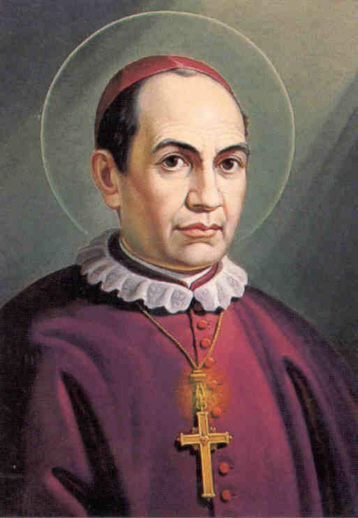The life of St. Anthony Mary Claret was so extraordinary that Pope Pius XII once called him “a giant in spirit.” Yet few Catholics today seem to know much about him.
Anthony was born to a large family in Spain on Christmas Eve, 1807. His father ran a small weaving business, with a handful of employees, out of the first floor of the family’s two-story home. Determined to become even more successful than his father, Anthony moved to Barcelona when he was 18 to begin a career in the growing textiles industry. But it didn’t take him long to realize that his heart was leading him elsewhere.
When he was 22, Anthony entered the seminary (and was the classmate of another man of recognized holiness, Blessed Francis Coll). He was ordained a diocesan priest in 1835. He started out as a parish priest, but was soon restless for another sort of ministry.
For a while, Anthony considered becoming a Jesuit priest. But he finally sought and received permission from the pope to live as a wandering missionary.
For the next several years, Anthony did just that. He traveled the cities and countryside of Spain, preaching, hearing confessions and leading retreats and parish missions. Devotion to the Eucharist and devotion to Mary were among his most common themes. Miracles of healings, prophecy and the reading of consciences in confession were also attributed to him.
Anthony became so well-known that some young men began to follow him to share in his work. They would become the Missionary Sons of the Immaculate Heart of Mary, the order better known today as the Claretians.
Anthony served the Church in Cuba, where he addressed serious problems, then in Spain, where he was holy confessor to Queen Isabella II.
In Madrid, Anthony preached in churches, convents, prisons and town squares. He founded a publishing house that produced hundreds of excellent Catholic books and pamphlets during the succeeding years, including many that Anthony himself had written. During this time he was also appointed rector of the Escorial, an important center of Spanish culture, politics and religious life.
Yet the drama of Anthony’s life was not over yet. In 1868, a revolution in Spain forced the queen into exile in France, and Anthony went with her. He went on to Rome in 1869 and 1870 to participate in the First Vatican Council.
After returning to France, Anthony died at the monastery where he was staying, on Oct. 24, 1870. Pope Pius XII canonized him in 1950. His feast day is October 24.



